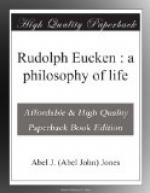When we turn to consider the characteristics of the Universal Spiritual Life, many problems present themselves. How can we reconcile freedom and personality with the existence of an Absolute? What is the nature of this Absolute, and in what way is the human related to it? What place should religion play in the life of the spiritual personality? These are, of course, some of the greatest and most difficult problems that ever perplexed the mind of man, and we can only deal briefly with Eucken’s contribution to their solution.
Can a man choose the highest? This is the form in which Eucken would state the problem of freedom. His answer, as already seen, is an affirmative one. The personality chooses the spiritual life, and continually reaffirms the decision. This being so, it is now no longer possible to consider the human and the divine to be entirely in opposition. And the more the spiritual personality develops, so much the less does the opposition obtain, until a state of spirituality is arrived at when all opposition of will ceases—then we attain perfect freedom. “We are most free, when we are most deeply pledged—pledged irrevocably to the spiritual presence, with which our own being is so radically and so finally implicated.” Thus freedom is obtained in a sense through self-surrender, but it is through this same self-surrender that we realise spiritual absoluteness. Hence it is that perfect freedom carries with it the strongest consciousness of dependence, and human freedom is only made possible through the absoluteness of the spiritual life in whom it finds its being.
English philosophers have dealt at length with the question of the possibility of reconciling the independence of personality and the existence of an Absolute. From Eucken’s point of view the difficulty is not so serious. When he speaks of personality he does not mean the mere subjective individual in all his selfishness. Eucken has no sympathy with the emphasis that is often placed on the individual in the low subjective sense, and is averse from the glorification of the individual of which some writers are fond. Indeed, he would prefer a naturalistic explanation of man rather than one framed as a result of man’s individualistic egoism. The former explanation admits that man is entirely a thing of nature; the latter, from a selfish and proud standpoint, claims for man a place in a higher world. There is nothing that is worthy and high in the low desires of Mr. Smith—the mere subjective Mr. Smith. But if through the mind and body of Mr. Smith the Absolute Spirit is realising itself in personality—then there is something of eternal worth—there is spiritual personality. There will be opposition between the sordidness of the mere individual will and the divine will, but that is because the spiritual life has not been gained. When the highest state of spiritual personality has been reached, then man is an expression—a personal realisation of the Absolute, is in entire accord with the absolute, indeed becomes himself divine.




